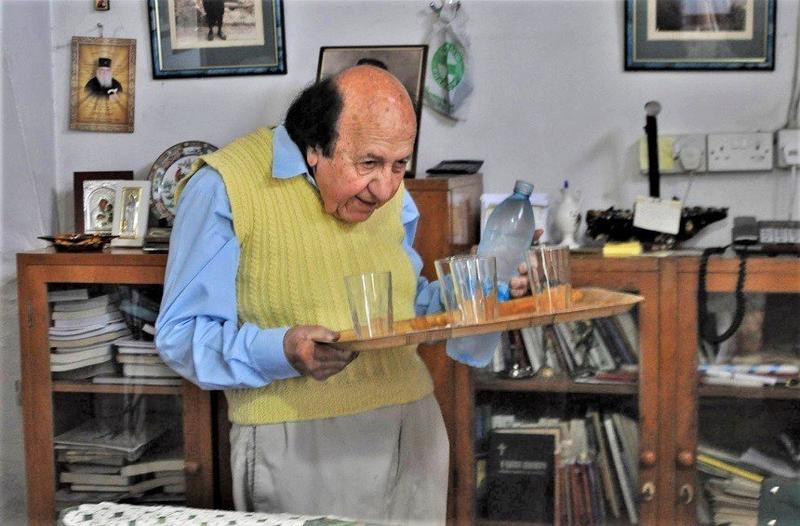
On the Limassol seafront, next to the old Catholic Church of St. Catherine (known by local people as the Church of the Franks), stands an old, two-storey house. It has been there for decades, a last remaining remnant of the area’s bygone days. This house is now officially a part of Limassol’s heritage from the previous century, thanks to a man who epitomizes what it means to be a true ‘Limassolian.’
Christos Papadopoulos was a man who bid his last farewell to his beloved city in 2018, leaving behind him a gift from his heart. His own home, which had played a significant role in the course of Limassol’s history, from the time of the Ottoman Empire to this day, and filled with historical documents and memorabilia, had been left as an inheritance to the Limassol Municipality. In recent years, only Christos and his sister Constania inhabited the ‘House of the Consul,’ as Limassolians referred to it, and they had both decided to donate the house and its vast yard to their city. This took place in 2015, when Christos Papadopoulos heeded the joint wishes of himself and his sister, following her sudden passing in 2014.
Former member of the Municipal Council and architect Christian Christou recalls Ms. Constantia declaring: “We don’t want any part of it sold or demolished, this is why I asked then-mayor Antonis Chatzipavlos, to declare the house a preserved building.” Wishing for their home to continue to bear witness to the era in which they grew up, Christos and Constantia envisioned turning the ground floor into a museum, bearing the name of their father, Leonidas Papadopoulos, Consul of Spain, while the first floor would be transformed into a space for the Municipality’s cultural and educational purposes, and the large lemon-tree orchard in the yard would be turned into a welcoming park.
The house next to the Catholic Church of Saint Catherine, which Christos and Constantia Papadopoulos donated to the Limassol Municipality.
This house, which, in the past, had been used as a wine warehouse, was the home of the Consul and his family, and this is how it became known to most of the locals. Leonidas Papadopoulos came from a wealthy family, and was even bestowed a medal twice by the King of Spain. In fact, before his children were born, this house was visited by the King of Hejaz (today’s Saudi Arabia).

The house of the Consul, with the balcony in its original form. Following his death, the house was placed on auction by a relative who had hidden away all the furniture in a room, leaving no chairs for anyone to sit on at the funeral. An aunt intervened, however, and bought the house so that the young orphans would not be left in the streets, and returned it to their mother.
In the environment in which Christos and Constantia grew up, the warm, open-hearted hospitality that is typical of Limassolians played a major role. The 2 siblings had as role models their father the consul, who would host meals for the poor, and their mother, whom Christos Papadopoulos remembers always as being a ‘homemaker with open arms,’ during times of both wealth and poverty. And so, up until his very last days, Christos would always welcome his guests with a wide, unforgettable smile, offering them flowers from his garden and anything else he might have on hand.
The large garden with the lemon trees, situated in the back of the house, along Jerusalem Street (Photos: Kristian Christou).
A humble and prudent man, Christos Papadopoulos was mild-mannered and kept a low profile, and though he may have become known for his roles on TV, there was a lot more to him than that. As a typical Limassolian, he was not only hospitable, but also showed a keen interest in the activities of local society. He was an active citizen, who always stayed abreast of all that took place in his city, took care of his orchards, and frequently attended the opera, never missing a performance at the Rialto Theater.
After the independence of Cyprus, the Theater Organization was founded, in which Christos Papadopoulos worked, acting in plays by Shakespeare to Aristophanes. His first show was ‘The Death of Dadon,’ which was attended by the President of the Republic, Makarios, as well as by many artists from Greece and Cyprus, among which was Mary Aronis. (Photos by the Cyprus Theater Museum)
His popular TV characters in the early stages of Cypriot television, as well as his emblematic home on the Limassol seafront, are certainly the most apparent reasons for Limassolians to keep Christos Papadopoulos in their collective memories. However, it was his down to earth character, his thespian talent, which allowed him to play some of the greatest roles on the worldwide stage, and his boundless love for the city and its people, which led him to leave behind a €3 million inheritance, that make him a worthy example of a Limassolian, even posthumously.
What is most important to note, however, is that he did not ever measure the value of the property which he donated to the Limassol Municipality in money; rather, he measured it in memories, human values, and emotions. After all, this is why All About Limassol (the Official Guide of Limassol) owed him such a tribute, for if there is anything worth holding onto in this city, it is the soul and energy of its people, and all the unique and amazing things they can create.
* Information and photos by Kristian Christou and the Cyprus Theater Museum.
* NOTE: The tributes of the Project "History of Limassol" present information that has emerged from historical research thus far. Any new data is embedded into the tributes, once it has been confirmed.